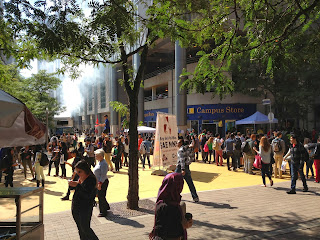In my role as the national coordinator for post-secondary campus
ministries in the PAOC I have the opportunity of working with some of the best
leaders in our movement. None of them are in it for fame or fortune. They do it
because God has called them to it and they know in the depths of their being
that what they are doing is significant and strategic. They are reaching our
nation, indeed the world, through the campus. And they are doing it in ways
that are both creative and courageous.
 |
| The seeds of something greater... |
I love this tribe: Compassionate, intelligent and articulate servant
followers of Christ who are writing a new chapter in the larger story of
post-secondary ministry in Canada.
I knew that if I could just get them all together, from East
to West, in one place where they could worship and pray together, hear and
learn from each other’s stories and strategize for the next steps in our collective
journey, it would be ‘nuclear’. That was the purpose of our Campus Synergy Summit. And, quite simply, 'nuclear' happened. Those of
us who were there are aware that we were part of something transcendent. We are
still searching for words to describe it.
These people are my friends. I really wanted them to all meet
each other. I make the connections between them regularly in my mind and heart.
I knew what I needed to do was to 'externalize
the internal'. My unofficial mission statement for the Summit was to see
happen in time and space what regularly
happens in my brain. That thing that lights me up on the inside, from knowing
these people and the ministries they represent, needed to happen in real time.
And did it ever! Seeing various parts of this tribe, from Halifax to Victoria
connect with each other, in a beautiful camp context ,and challenge and encourage each other was beyond
gratifying. There was also input by some of our national leaders, such as David Wells and David Hazzard. A genuine “synergy” happened. The event was so more than the
sum of its parts.
Our vision going forward is:
Every Campus: by whatever means.
The challenge is: Why Not? The corollary
to that challenge is: Why Not Us? It is
not to build an edifice to hubris. It is to rise to the challenge as a movement and to serve
the campus and the broader Church by being who God is calling us to be. And
trust me, we spent a lot of time and focus refining just what that might be. We
are all calling on God to help us understand just what that might look like.
 |
| Distilling what God has been saying to us... |
So, what would it look like?
Well, it would embody Compassion. It would embody a Humility that
recognizes that without God’s direct empowerment and leading it will surely
wither. And it would involve a heart of Service, which seeks to bless the university or college, and particularly the multiple hundreds of thousands of students who are
forging their identities and futures on the campuses of our nation. And it would
do it with an expectancy of what the living God can and will do in and through
people yielded to Him.
Among a host of other things, it would involve reaching out to those who are dispossessed
and marginalized. It would involve challenging our comfort and embracing the incredible diversity that we
see on our campuses and working to model the Kingdom in and through community
on campus. In many ways, our people are doing this so well. At the same time,
we all painfully realize that we have so much further to go.
It will involve a comprehensive, whole person approach to discipleship,
witness and worship.
And it will involve a growing relationship with all three
Persons of the living Triune God, Who is not only real, but alive, powerful,
engaged, involved, dynamic and, of course, missional.
And it involves doing it
together!

















